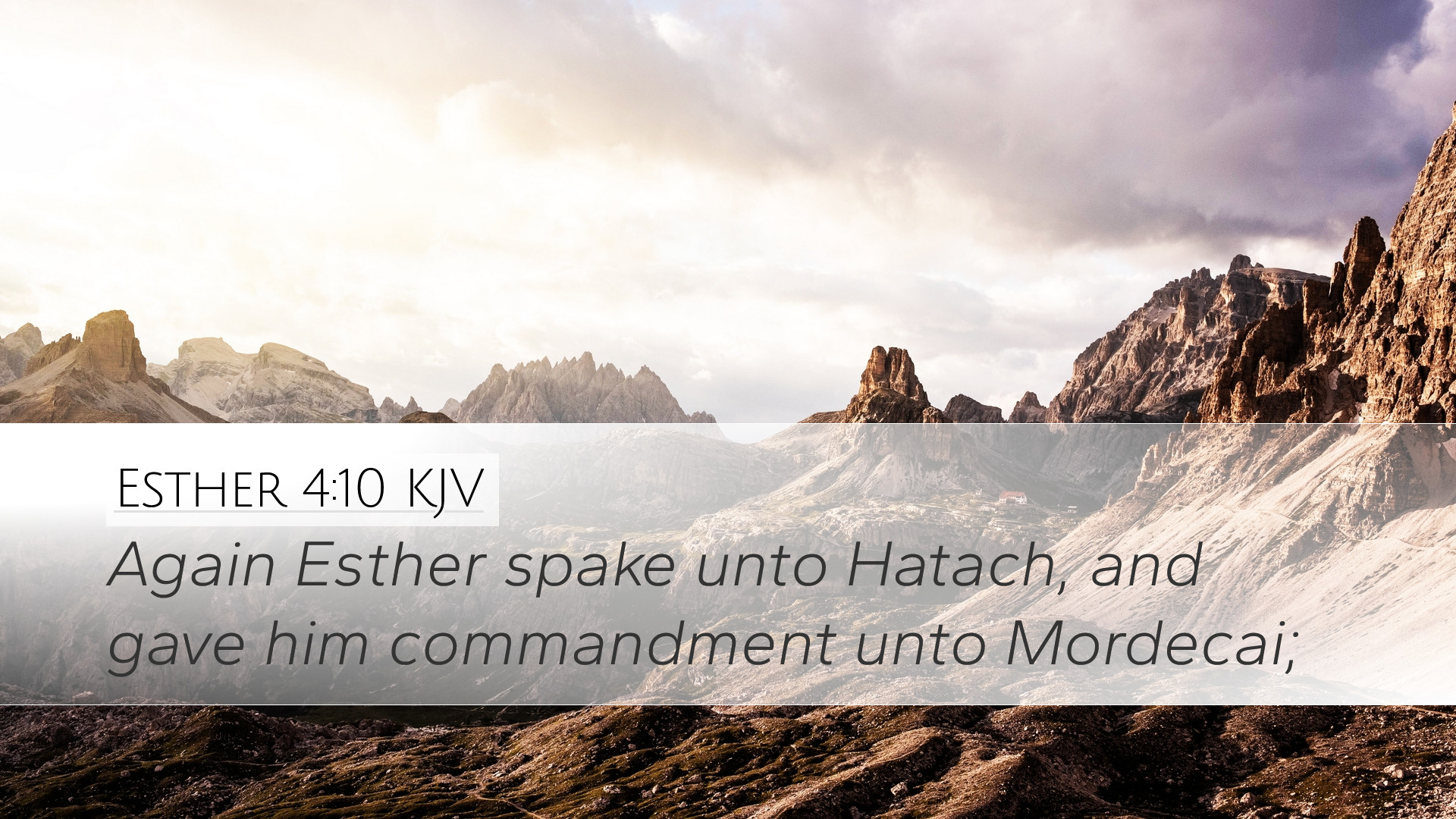Old Testament
Genesis Exodus Leviticus Numbers Deuteronomy Joshua Judges Ruth 1 Samuel 2 Samuel 1 Kings 2 Kings 1 Chronicles 2 Chronicles Ezra Nehemiah Esther Job Psalms Proverbs Ecclesiastes Song of Solomon Isaiah Jeremiah Lamentations Ezekiel Daniel Hosea Joel Amos Obadiah Jonah Micah Nahum Habakkuk Zephaniah Haggai Zechariah MalachiEsther 4:10
Esther 4:10 KJV
Again Esther spake unto Hatach, and gave him commandment unto Mordecai;
Esther 4:10 Bible Commentary
Commentary on Esther 4:10
Esther 4:10 (KJV): "Again Esther spake unto Hathach, and gave him commandment unto Mordecai."
This verse stands as a pivotal moment in the Book of Esther, marking the transition from silence to action in the face of impending tragedy. The correspondence between Esther and Mordecai signifies a crucial point where the stakes are high, and the tension in the narrative escalates.
Contextual Overview
Historical Background: The events of the Book of Esther take place during the Jewish exile in Persia, under the reign of King Ahasuerus (Xerxes I). The Jews find themselves threatened by Haman's wicked decree to annihilate them. Esther, a Jewish woman who has become queen, is in a unique position of influence but faces peril in approaching the king without invitation.
Commentary Insights
1. The Importance of Communication
Matthew Henry: Henry emphasizes the necessity of dialogue in addressing crises. Esther's proactive communication with Mordecai highlights the importance of seeking counsel in times of distress. This reflects the biblical principle of mutual support, as believers are encouraged to share burdens and seek wisdom through others.
2. The Role of Courage
Albert Barnes: Barnes notes that Esther's act of sending a message is emblematic of her courage. The command she relays signifies her willingness to confront danger and responsibility. In biblical leadership, courage often necessitates action even amidst fear—a reminder for pastors and leaders today about the necessity of standing firm for righteousness.
3. The Hidden Hand of Providence
Adam Clarke: Clarke draws attention to God's providential hand throughout the entire narrative. Even in this instance, Esther's actions—though fraught with risk—are part of a grander divine orchestration. This reflects the theme that even amidst dire circumstances, God is in control and works through the choices of His people, highlighting the interplay between divine sovereignty and human agency.
Theological Implications
- Faith in Adversity: Esther's hesitation and eventual decision to communicate with Mordecai reinforces the theme of faith. Her actions represent a divine mandate to act, demonstrating that faith often compels believers to respond even when the outcome is uncertain.
- Community and Support: The relationship between Esther and Mordecai illustrates the significance of community. Support systems within faith communities are essential for facing spiritual and physical trials.
- God’s Plan vs. Human Will: This verse invites reflection on the interplay of our choices and God's purposes. The assurance that God will fulfill His promises—even through our weaknesses—provides profound comfort and motivation for believers.
Pastoral Applications
- Encouragement to Speak Up: Pastors can encourage congregants to voice their concerns and take action regarding injustices. Esther's communication serves as a model for how believers can address challenging situations within their communities.
- Building Trust Among Believers: The trust between Esther and Mordecai underlines the need for transparency and strong relationships in church settings. Leaders should foster environments where members feel secure to share their struggles.
- Emphasizing Prayer and Action: As leaders invoke the importance of prayer, they must also stress that prayer should lead to action. Esther's story serves as a reminder that while prayer is vital, it must be accompanied by courageous deeds.
Conclusion
Esther 4:10 encapsulates the transforming power of communication in the face of adversity. The insights gleaned from public domain commentaries remind us of God’s providence and our role as instruments of His purpose. In appealing to both the heart and mind, Esther's narrative challenges us to act in faith, demonstrating that righteous action, coupled with prayer, can initiate change even in the most challenging situations.


